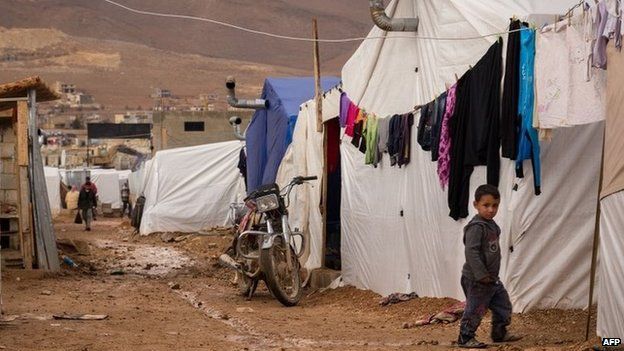Syria conflict: WFP suspends refugee food aid scheme
- Published

The World Food Programme (WFP) has been forced to suspend a critical food aid scheme for more than 1.6 million Syrian refugees because of a funding crisis.
The UN agency said the programme gave refugees in Jordan, Lebanon, Turkey, Iraq and Egypt vouchers to buy food.
Without such assistance, many families would go hungry this winter, it warned.
The WFP's Executive Director, Ertharin Cousin, said it was in critical need of funding, with $64m (£41m) required to support refugees in December alone.
More than 3.2 million people have fled Syria and another 7.6 million have been displaced inside the country since the uprising against President Bashar al-Assad began three years ago.
'Devastating' impact
Under the WFP programme suspended on Monday, poor Syrian refugees were provided with vouchers to buy food in shops, injecting about $800m (£508m) into the local economies of their host countries.
The agency said that for people already struggling to survive the harsh winter in the region, particularly those in camps and informal settlements in Lebanon and Jordan, the consequences of halting such assistance would be "devastating".
"A suspension of WFP food assistance will endanger the health and safety of these refugees and will potentially cause further tensions, instability and insecurity in the neighbouring host countries," Ms Cousin said.
She warned that the WFP's Syria emergency operations were now "in critical need of funding" and that many donor commitments remained unfulfilled.
If new funding arrived, the agency said it would immediately resume assistance for refugees who used electronic vouchers to buy food.
The WFP also raised concerns about the negative impact the suspension of the operation would have on the host countries bordering Syria, which its regional emergency co-ordinator said had "shouldered a heavy burden throughout this crisis".
The BBC's Jim Muir in Beirut says that now the money has run out and the scheme has been halted, the refugees will be even less welcome than they already are in countries like Lebanon, which has been overwhelmed by more than 1.1 million refugees.
It has decided it cannot take any more, and has closed its borders.
Most other relief agencies also suffer from chronic under-funding, and have had to restrict their operations, trying to target the most vulnerable, our correspondent adds.
In a separate development on Monday, jihadist militants from Islamic State (IS) killed at least 15 Iraqi border guards at a checkpoint along the border with Syria, near the town of Walid, Iraqi officials said.